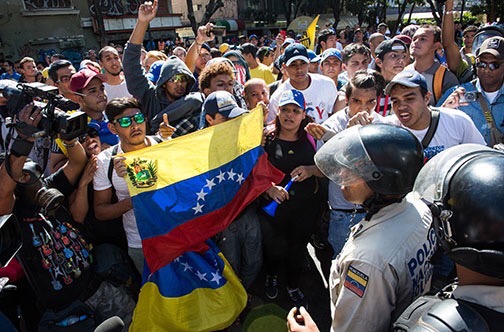Will the Economic Crisis Trigger a Coup in Venezuela?
Economic conditions in Venezuela continue to fall in a precipitous downward spiral. According to the IMF, Venezuela’s economy is predicted to contract by 8% this year, while inflation may reach 720%. These facts make Venezuela the world’s worst performing economy for a second year in a row.
As with almost all goods, Venezuela imports its currency. The historically high inflation is leading to an unprecedented situation in which Venezuela “is now so broke that it may not have enough money to pay for its money.”1 Venezuela also faces the risk of hyperinflation – “the stage where the economy reaches total chaos — and could reach a ‘total collapse of the economic system’ in 12 to 18 months if there are no changes in economic policies.”2
Additionally, Venezuelans suffer from chronic shortages of basic food, water and medicine. In particular, the lack of common medicines has led to an untold number of preventable deaths. Nicholas Casey at the New York Times captures the tragedy of this humanitarian crisis in Dying Infants and No Medicine: Inside Venezuela’s Failing Hospitals. The situation is so dire that even U.S. officials have begun voicing worries about the possibility of a total economic collapse and the unrest that would follow, likely spilling over to Venezuela’s neighbors – Colombia and Ecuador.
For these reasons, the opposition did not have any problems quickly gathering the 1.8 million signatures needed to hold a referendum on whether to keep Venezuela’s President, Nicolás Maduro, in office. Maduro, however, does not show any signs of allowing this constitutionally mandated process to go forward. The National Electoral Board (CNE) is obligated to verify the signatures within five days. Yet after two weeks, it has still not done so.3 Another problem for the opposition is Maduro’s cooptation of the judiciary. Latin American expert, Javier Corrales, explains that
In the Maduro era, this [judicial] shield has been reinforced to an extraordinary degree. Ever since the opposition won the 2015 legislative election, obtaining what should have been a decisive two-thirds majority, Maduro has turned his judicial shield into a machine that torpedoes any initiative he deems adverse or undesirable. Every initiative by the Congress has been deemed unconstitutional by the courts. Not even the right to question ministers has been allowed to stand. The Congress has been disarmed.4
It may be the military – a powerful, but not overtly political, actor – that ultimately decides Venezuela’s future by choosing to support Maduro or the opposition. Until recently, the privileged status of the military and their families has exempted them from the shortages and long lines for food and basic goods. The severity of the economic crisis appears to be changing this situation. In a recent incident, “six members of the Venezuelan military were detained by local authorities for stealing goats…[saying] they did it to feed themselves, since they had no food left in their barracks.”5
Last year, I thought the 40% chance of a coup in Venezuela assigned by the betting markets was way too high. This year, however, that number sounds like a reasonable assessment of the Venezuelan political reality.
